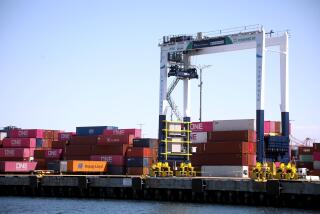Toyota, Honda Deliver 1st U.S. Fuel-Cell Vehicles
The first low-pollution, hydrogen fuel-cell passenger vehicles in the U.S. hit the road in Southern California on Monday as Toyota Motor Corp. and Honda Motor Co. handed the car keys to their partners in a pair of long-term research projects.
The automakers, which have launched similar programs in their home market of Japan, are hoping that their respective technologies become the industry standard as fuel-cell development progresses.
Representatives of both companies called the deliveries historic, but they cautioned that it will be decades before motorists can walk into a dealer’s showroom and drive away in one of the vehicles.
Toyota will lease six of its so-called fuel-cell hybrid vehicles, based on the Highlander sport utility vehicle, to UC Irvine and UC Davis.
The automaker is leasing each vehicle for $10,000 a month for 30 months but is supplying most of the lease money through grants. As part of the program, four hydrogen fueling stations have been opened and two more are planned by summer to link drivers of fuel-cell cars in the northern and southern parts of the state, said James Press, chief operating officer for Torrance-based Toyota Motor Sales USA.
Honda is leasing five of its four-passenger FCX fuel-cell vehicles to Los Angeles for daily use in the city fleet and on Monday presented Mayor James K. Hahn with keys to the first one. The city will pay a nominal $500 a month for each vehicle, and Honda will provide fueling services.
Analysts said the two programs should go a long way toward generating performance data that can help industry, government and the public better understand and perfect fuel-cell technology.
There still are “a million factors” to be addressed be- fore automotive fuel cells become commonplace, said David Schoenwald, president of New Alternatives Fund Inc., a New York mutual fund that invests in environmentally friendly technologies. “But it’s not going to happen” until automakers get such prototype cars on the road.
Fuel cells, long used in spacecraft, generate electricity by combining hydrogen and oxygen. Although the production of electrical energy used to make fuel-grade hydrogen creates some pollution, fuel-cell vehicles generally are emission-free, with steam as the only byproduct.
The California Air Resources Board has certified both automakers’ fuel-cell cars as zero-emission vehicles.
In all, Honda said, it will lease 30 fuel-cell vehicles in Japan and California during the next three years; Toyota will lease 20.
Press of Toyota said challenges remain before fuel-cell vehicles will be ready for retail -- among them improving fuel- cell efficiency and developing a nationwide system for hydrogen processing and delivery.
Toyota says its five-passenger FCHV gets 180 miles on a hydrogen fill-up, equivalent to 63 miles per gallon of gasoline; top speed is 96 mph. Honda’s four-seat FCX has a range of 170 miles and a top speed of 90 mph.
The Detroit-area Big Three of General Motors Corp., Ford Motor Co. and DaimlerChrysler are among other automakers planning to introduce fuel-cell vehicles in the U.S. for research.






